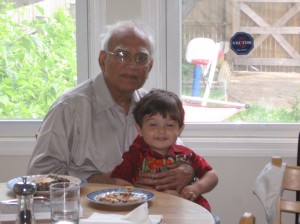
A couple of people have pointed out that my approach to Alzheimer’s, as I outlined in my TED talk, looks an awful lot like disaster preparedness. That’s not by accident. My job shapes my personal life all the time, and since Alzheimer’s is a disaster waiting to happen to me, I took a disaster preparedness approach. The first draft of my speech explicitly referenced earthquakes, but June didn’t like it.
In a nutshell, here’s the disaster preparedness approach:
- Figure out what the most likely disasters you’re facing are.
- Take what steps you can to prevent them
- Estimate what kind of damage they could do
- Create resilience to help you respond to and survive that damage
If you’re worried about earthquakes, then you identify the most seismically active areas in your location, don’t live there, study up on the damage done by past earthquakes, and then pre-position first aid kits, emergency food supplies, and get training on search and rescue.
(That is the deeply simplified version; you can get a better explanation here.)
If you’re worried about Alzheimer’s – well, that’s your disaster right there. It’s the most likely one in my old age. I am eating low fat and exercising for 30 minutes a day as my prevention effort. (And I guess this blog counts as keeping mentally active.) I’m estimating potential damage by watching my father decline. He was always my teacher; this is his last lesson for me. And I’m developing resilience by trying to shape my body and mind into a person who will be happy and loving, even with dementia.
If you look at the TED.com comments on my talk (For the love of summer days and fuzzy puppies do not look at the youtube comments.), you’ll see a lot of people arguing that it’s insane to prepare for something that may never happen. You get that response when you’re trying to get ready for disasters, too. People think it’s a waste of time and money to get ready. (Yes, I’m talking to you Army Corps of Engineers.) They say that life is for living and probably it will all be fine.
People are always going to say that. Human beings are wired to hate thinking about future risks. If you prepare for a disaster that never comes, everyone makes fun of your wasted efforts.
In my own case, I answer this with the argument that my efforts toward dementia resilience are also enhancing my life right now. I like origami. I like drawing. I like yoga. I could have decided to needlepoint or juggle, but that sounds horrible. You can draw the same parallel to community disaster resilience. Seismically sound buildings also handle storms better, and they last longer. First aid kits are useful for more than just earthquakes. So is search and rescue.
You can build a life today that prepares you for a whole range of tomorrows.
What does this have to do with development? Well, global warming is going to bring us a massive increase in natural disasters. Disasters that will hit poor people the hardest, and keep low income countries from developing. Done right, poor communities can build resilience for the natural disasters of the future and improve their lives right now.
But we’re going to have to actually think about it first.
********
Don’t build in a flood plain

